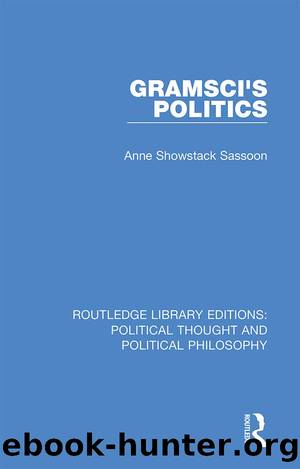Gramsci's Politics by Anne Showstack Sassoon

Author:Anne Showstack Sassoon [Sassoon, Anne Showstack]
Language: eng
Format: epub
Tags: Communism; Post-Communism & Socialism, History & Theory, Political Ideologies, Political Science, General
ISBN: 9781000704884
Google: Jfe-DwAAQBAJ
Goodreads: 189236
Publisher: Routledge
Published: 1980-01-01T00:00:00+00:00
Posing the problem in this way does indeed have âas a result a considerable extension of the concept of intellectual, but it is the only way which enables one to reach a concrete approximation of realityâ. (SPN, p. 12.) Not only is the word intellectual applied within civil society to such groups as school teachers or journalists as well as to university professors but also to a whole range of positions in political society from the lowest state official, perhaps the clerk in the local government office, to the highest civil servant. By defining intellectuals in terms of âthe entire social stratum which exercises an organisational function in the wide senseâwhether in the field of production, or that of culture, or in that of political administrationâ (SPN,p. 97) all these strata must be included.
The other attribute which the different types of intellectuals have in common, in addition to the kind of functions they perform in different positions in society, is the fact that they find themselves in a mediated relationship to the world of production, in Gramsciâs terms, and as we shall see in a moment, in different kinds of relationships to the different classes in society. It is this relative autonomy which links them together and which has particular political consequences for it represents an area of potential political space within which a revolutionary party can work if it has a strategy which takes account of these strata. It is significant that Gramsci does not use the term petty bourgeoisie in this regard, differentiating these groups from those engaged in the petty bourgeois mode of production.
An outstanding feature of Gramsciâs analysis of the role and position of intellectuals in modern society is its complexity and its constant reference to an examination of a concrete reality. This complexity can only be rendered by a multi-dimensional analysis. The first dimension refers to a type of categorisation which can be applied to any social reality. But even at this level of abstraction, when Gramsci speaks of âorganicâ and âtraditionalâ intellectuals, he is very conscious of the dangers of schematisation and the need for a concrete historical analysis.6 The second dimension concerns the differences in the position of urban and rural intellectuals. Although this discussion is presented in the Notebooks in general terms, it is rooted very much in an examination of the Italian social formation, and his discussion of other historical examples is almost entirely in terms of the organic-traditional dimension. When we attempt to join these two dimensions together, the picture is indeed complex.
In terms of theoretical differentiation, the most important of the variety of forms of intellectuals are the organic and the traditional. Organic intellectuals are the more directly linked to the dominant mode of production.
Every social group, coming into existence on the original terrain of an essential function in the world of economic production, creates together with itself, organically, one or more strata of intellectuals which give it homogeneity and an awareness of its own function not only in the economic but also in the social and political fields.
Download
This site does not store any files on its server. We only index and link to content provided by other sites. Please contact the content providers to delete copyright contents if any and email us, we'll remove relevant links or contents immediately.
| Anarchism | Communism & Socialism |
| Conservatism & Liberalism | Democracy |
| Fascism | Libertarianism |
| Nationalism | Radicalism |
| Utopian |
The Secret History by Donna Tartt(19092)
The Social Justice Warrior Handbook by Lisa De Pasquale(12191)
Thirteen Reasons Why by Jay Asher(8912)
This Is How You Lose Her by Junot Diaz(6889)
Weapons of Math Destruction by Cathy O'Neil(6281)
Zero to One by Peter Thiel(5802)
Beartown by Fredrik Backman(5759)
The Myth of the Strong Leader by Archie Brown(5509)
The Fire Next Time by James Baldwin(5449)
How Democracies Die by Steven Levitsky & Daniel Ziblatt(5219)
Promise Me, Dad by Joe Biden(5154)
Stone's Rules by Roger Stone(5088)
A Higher Loyalty: Truth, Lies, and Leadership by James Comey(4964)
100 Deadly Skills by Clint Emerson(4927)
Rise and Kill First by Ronen Bergman(4790)
Secrecy World by Jake Bernstein(4753)
The David Icke Guide to the Global Conspiracy (and how to end it) by David Icke(4720)
The Farm by Tom Rob Smith(4514)
The Doomsday Machine by Daniel Ellsberg(4490)
